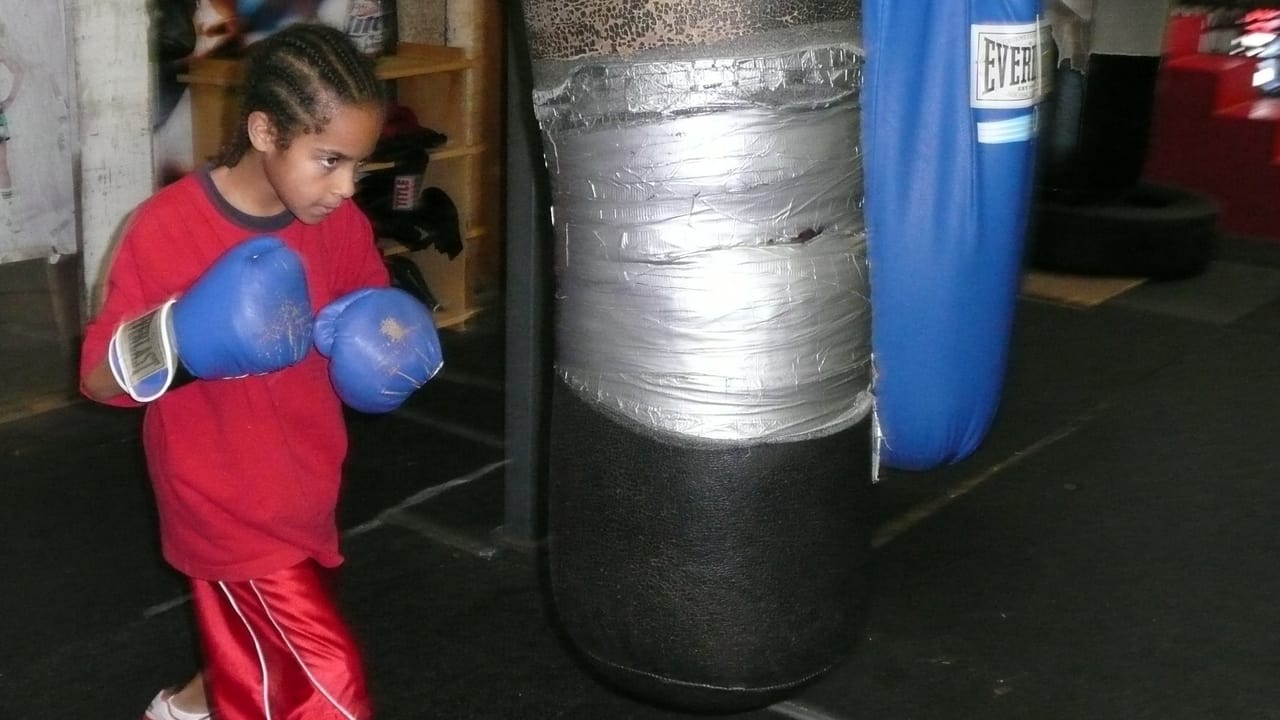Tacticalin
An absolute waste of money
Doomtomylo
a film so unique, intoxicating and bizarre that it not only demands another viewing, but is also forgivable as a satirical comedy where the jokes eventually take the back seat.
Juana
what a terribly boring film. I'm sorry but this is absolutely not deserving of best picture and will be forgotten quickly. Entertaining and engaging cinema? No. Nothing performances with flat faces and mistaking silence for subtlety.
Cissy Évelyne
It really made me laugh, but for some moments I was tearing up because I could relate so much.
DogFilmCritic
I saw this film last night and i was surprised their way of showing the public what this film is about,from the beginning they show you what the film will be about which is a boxing gym as the title suggests, from there you go on a personal tour of how it operates to how is taught the sweet science.see the point of view of the coaches and members that train there regularly from fighters to everyday people that just want workout escaping there daily life routine,the boxing gym becomes the country club for the average Joe's everyone knows who you are within the community we don't see much of their members profiles but we see their interactions with boxing, man woman child and elderly trained for their own reasons,and that way you can summarize this film.this is the first time I hear of Frederick Wiseman i don't know if all his documentaries are this way or not,one feels cheated in a way really what you see is someone shooting in the gym nothing more,It may seem like a video seen on you tube, but I believe that the vision of Wiseman is to show the simplicity of things the protagonist is boxing and secondary characters are the people training, everyone trains different some more than others but all are there to learn and understand it
Steve Pulaski
Frederick Wiseman's Boxing Gym is the first film of the man that I haven't enjoyed to the extent of praising and demanding everyone of my immediate friends the value of seeing it, and the first time I was grateful to see his runtime on a picture was relatively short. Boxing Gym profiles a boxing gym in Austin, Texas, a place that is packed with folks of all different sizes, ages, builds, and ethnic backgrounds who want to express their love and aspirations for the field of boxing, and runs at only ninety-one minutes long, a farcry from some Wiseman films which can last up to six or seven hours a piece. At ninety-one minutes, Boxing Gym is perfect in length, which is something I never wanted to say about a Wiseman film.In order to appreciate Boxing Gym, I would go as far to say you have to be into boxing or the sport of martial arts, and not just Wiseman and his ever-so fascinating tactics. As a non-fan of boxing and its surrounding, sister fields, there's little the film offered other than a quiet, often meditative, but unfortunately, underexplored subsector of American pastimes that focuses so much on the grueling rituals its patrons endure and less on their mentalities and personalities on their passion. Exploring the activity behind a certain sport like this is only half the battle; what needs to be considered is the level of time, effort, persistency, and passion put into this pastime with, often times, far-reaching dreams, and sadly, Boxing Gym doesn't house much of the latter.Wiseman explores the patrons at the gym with a sense of alienation, which is especially strange given how much he seemed to really immerse himself in cultures like a college campus, a mental hospital, a public housing project in Chicago, and even a sleepy town in Maine. Wiseman frequently puts himself in tough, uncompromising positions as a documentary filmmaker, effectively making him one of the bravest documentarians I know, unafraid to explore locales and institutions that otherwise go unseen by most of the public. With Boxing Gym, idea may have surpassed reality, and in turn, we see a display of events rather than characters, and the events we do see are monotonous and dreary, almost like a ritual themselves. We are then robbed of the ideas that can stem from a passion that allows such commitment and devotion.Wiseman has never been about forcing ideas down a viewer's throat, nor has he ever been known for formal, on-camera interviews, the use of title cards, or anything. He lets the pictures, the sound, and the dialog carry the story, strung together by a surprisingly-flawless editing structure, given the lack of directorial interference on his behalf. However, Boxing Gym feels empty and slight, never focusing enough on the people behind these gyms and far too busy profiling tiresome scenes of boxing, running, jumping rope, and training, with the interactions between trainer and trainee are limited and in short supply.The most entertaining segments in Boxing Gym show Wiseman focusing on people who discuss a sense of pride developing because of their devotion to the sport. This is when we get a sense of who is behind this boxing gym and what kind of people we're dealing with. We hear from fathers who want their kids to attend the gym regularly, people who have trained for life and possess professional ambitions all the more, and even young people looking for an activity and a hobby. Not everyone goes to the boxing gym for the same reasons, Wiseman seems to be telling us, but again, that's something we could've assumed.Like a lot of sports interviews and press conferences, the subjects in Boxing Gym are predictable and what they say is even more predictable; on that note alone the film seems to be incredibly distant from what Wiseman has been doing for years. What he did with films like At Berkeley, Belfast, Maine, Public Housing, and Titicut Follies was profile institutions with people whose stories went criminally untold and left without any particular voice. Wiseman cut through the objectifying, analytical, empiricist approach to subjects that also needed a firmly human core at their center, and Wiseman strove to get that and, with those four aforementioned films, achieved untold greatness. With Boxing Gym, the results, while somewhat commendable and consistently watchable, feel perfunctory and almost a waste of time for Wiseman, which may only be evident by the film's surprisingly brief runtime.Directed by: Frederick Wiseman.
gregking4
As with his previous documentary La Danse, which was set inside a prestigious Parisian ballet school, octogenarian filmmaker Frederick Wiseman (best known for his Titicut Follies) takes inside another institution that relies on sweat, discipline, routine, and lots of practice. This time around though the setting is a neighbourhood boxing gym, established in a refurbished garage in a suburb of Austin, Texas. The gym is run by Richard Lord, a former pro boxer, who welcomes anybody into the facility and seems to take a personal interest in his customers. There is a sense of community and of belonging to the place, which is something of a melting pot. Faded posters adorn the walls. Parents bring in their babies while they train. There are some insights into the lives of those who regularly inhabit this gym, and we learn a little about their motivations and hopes. We see many of the clientele in action, sparring, jumping rope, stretching, crunching, hitting the speed bags, and playing with medicine balls. Boxing Gym is typical Wiseman and unfolds in his unique languid, observational style, aided by John Davey's fluid camera-work. There is no voice over narration, no talking heads interviews, and he does not impose himself on the material. However, there is more of a sense of energy here than in many of his previous films. Boxing Gym is fairly slight stuff, and is of limited appeal. And with a brisk running time of 90 minutes, it is also his shortest film for some time.
stourleyk
I am not familiar with director Wiseman's body of work, or should I say work of the body. But I am a member of a boxing gym and an enthusiast of film, especially independent film.The boxer in me dwelled on every detail. The equipment, the space, the athletes, the trainers, what was said and wore, training methods, punch combinations, etc. As observation, the film is a great success.The film may not be, however, sufficiently directorial for viewers disinterested in boxing. Persons depicted in the film say things. Wiseman leaves it at that. No attempt is made to develop a narrative, either for the culture of the gym or for any one individual. The leaving-alone of stories serves Wiseman well. Such an approach begs contrast with Werner Herzog's approach to his recently released Cave of Forgotten Dreams.Those who would see the film as a study of "larger questions—about the nature of human society, the relationship between individuals and institutions, and the ways in which people interact and influence each other" are narrating the film in terms of their own expectations. The film, I humbly suggest, is best approached from another angle. To quote basketball player Allen Iverson, "It's about practice." An old man shadow boxing, a young man talking about working out instead of working out, parents working out while keeping an eye on their babies: practice is the unity of intention about their intentions. I would encourage viewers to focus themselves in this selfsame way. If a single lens is to be privileged (even as I ought not presume the privilege to claim so) it is this lens of practice. Wiseman is wise to only let stand before us the facts. Ultimately, the rest is up to us. That is the practice that good trainers teach.

